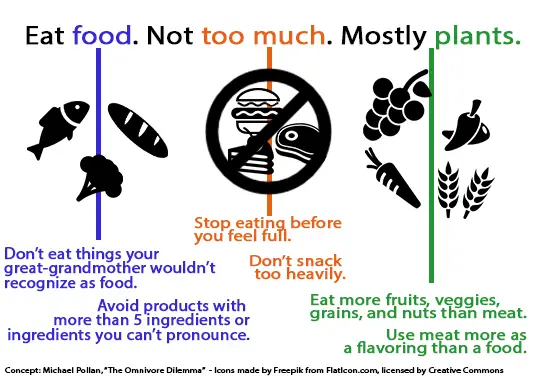Physical Address
304 North Cardinal St.
Dorchester Center, MA 02124

Being an omnivore can be healthy if balanced. A varied diet provides essential nutrients and supports overall health.
An omnivorous diet includes both plant and animal foods, offering a wide range of nutrients. This diverse intake can lead to better health by providing proteins, vitamins, and minerals necessary for bodily functions. Eating a balanced omnivorous diet means incorporating fruits, vegetables, grains, meats, and dairy.
Each food group contributes differently to your nutritional needs. Proper portion control and mindful eating habits are key to maximizing the health benefits of being an omnivore. Avoiding processed foods and focusing on whole, nutrient-rich options can enhance the advantages of this dietary approach. Ultimately, balance and variety are crucial for maintaining a healthy omnivorous diet.

Credit: m.youtube.com
The omnivore diet includes both plants and animals. This balanced diet offers various nutrients. Many people wonder if being an omnivore is healthy.
An omnivore eats both meat and plants. Humans are natural omnivores. They consume fruits, vegetables, grains, and meat. This diet helps in getting a wide range of nutrients.
Early humans were hunters and gatherers. They ate what was available, including plants and animals. This mixed diet provided essential vitamins and proteins.
Over time, humans learned to farm and raise animals. This led to more diverse food options. The omnivore diet became even more balanced.
The omnivore diet offers various health benefits. It includes essential vitamins and minerals. These nutrients help in maintaining energy levels.
Here is a table showing key nutrients:
| Food Type | Key Nutrients |
|---|---|
| Fruits | Vitamins, Fiber |
| Vegetables | Vitamins, Minerals |
| Meat | Protein, Iron |
| Grains | Carbohydrates, Fiber |
Eating a variety of foods ensures a balanced diet. This can lead to better health and wellbeing.

Credit: www.kqed.org
Being an omnivore means you can eat both plants and animals. This dietary choice offers a wide range of nutrients. It helps you get a balanced diet. Let’s explore how this works.
Omnivores have access to a variety of essential nutrients. These include proteins, vitamins, and minerals. You can get proteins from meat, fish, and beans. Vitamins and minerals come from fruits, vegetables, and grains.
| Food Type | Key Nutrients |
|---|---|
| Meat | Protein, Iron, Zinc |
| Fish | Omega-3, Vitamin D |
| Fruits | Vitamin C, Fiber |
| Vegetables | Vitamins A, K, Folate |
| Grains | Fiber, B Vitamins |
A balanced diet means eating a variety of foods. It includes proteins, carbs, and fats. Being an omnivore makes this easy. You can enjoy different foods every day.
This variety helps you stay healthy. Each food group gives you different benefits. Proteins build muscles. Carbs give you energy. Fats are good for your brain.
Protein is essential for building muscles, repairing tissues, and maintaining overall health. As an omnivore, you have access to a diverse range of protein sources. Both animal and plant proteins offer unique benefits. Let’s explore these options in detail.
Animal proteins are complete proteins. They contain all essential amino acids. Common animal protein sources include:
Animal proteins are easily digestible. They support muscle growth and repair effectively.
Plant proteins are also vital. They offer fiber, vitamins, and minerals. Common plant protein sources include:
Plant proteins often come with additional nutrients. They can help lower cholesterol and improve gut health.
| Protein Source | Benefits |
|---|---|
| Chicken | High protein, low fat |
| Beans | Rich in fiber and protein |
| Fish | Omega-3 fatty acids |
| Nuts | Healthy fats and protein |
Omnivores enjoy a varied diet that includes both plant and animal foods. This can provide a balanced intake of vitamins and minerals essential for health. Understanding the key vitamins and important minerals in an omnivore diet helps ensure overall well-being.
Vitamins are vital for many body functions. They help with energy production and immune support. Here are some key vitamins found in an omnivore diet:
Minerals are crucial for various body functions like bone health and fluid balance. Here are some important minerals found in an omnivore diet:
| Mineral | Function | Sources |
|---|---|---|
| Calcium | Essential for strong bones and teeth. | Dairy products, leafy greens |
| Iron | Important for oxygen transport in blood. | Red meat, beans, spinach |
| Zinc | Supports immune function and wound healing. | Meat, shellfish, legumes |
| Magnesium | Needed for muscle and nerve function. | Nuts, seeds, whole grains |
| Potassium | Regulates fluid balance and muscle contractions. | Fruits, vegetables, dairy |
Eating a balanced diet can offer various health benefits. Omnivores get nutrients from both plants and animals. This diverse diet helps in several ways.
An omnivorous diet includes fruits, vegetables, meat, and dairy. These foods are rich in vitamins and minerals. Vitamin C from fruits and zinc from meat strengthen the immune system.
Fruits and Vegetables:
Meat and Dairy:
Omnivores get energy from carbohydrates, proteins, and fats. Carbohydrates from grains provide quick energy. Proteins from meat help build muscles. Fats from dairy and nuts offer long-lasting energy.
| Food | Energy Source |
|---|---|
| Whole Grains | Carbohydrates |
| Chicken Breast | Proteins |
| Almonds | Fats |
Being an omnivore means eating both plants and animals. This can be healthy, but there are some risks. Understanding these risks helps in making better food choices. Let’s explore some of these risks.
Processed foods often contain high levels of sugar, salt, and fat. These can lead to obesity, diabetes, and heart disease. Many processed foods also have preservatives and additives. These can be harmful to your health.
Consider the following examples of processed foods:
Eating too many processed foods can harm your body. It is better to eat fresh, whole foods.
Eating too much of any food can be harmful. Overeating meat can lead to health issues. These include high cholesterol and high blood pressure. Overeating sugary foods can cause weight gain and diabetes.
Consider this table for potential risks of overconsumption:
| Food Type | Risks |
|---|---|
| Red Meat | High Cholesterol, Heart Disease |
| Sugary Foods | Weight Gain, Diabetes |
| Salty Foods | High Blood Pressure, Kidney Damage |
Eating a balanced diet is key. This means not eating too much of any one type of food.
Choosing the right diet can impact your health. Comparing diets helps you understand the benefits and drawbacks of each. Is being an omnivore healthy? Let’s find out by comparing diets.
Omnivores eat both plants and animals. Vegetarians avoid meat but consume dairy and eggs. Let’s compare their diets.
| Criteria | Omnivore | Vegetarian |
|---|---|---|
| Protein Sources | Meat, fish, plants | Plants, dairy, eggs |
| Vitamin B12 | Abundant in meat | Limited, often needs supplements |
| Iron | High in meat | Found in plants but less absorbable |
Omnivores get a variety of nutrients from both plants and animals. Vegetarians need to balance their diet to avoid deficiencies. Each diet offers unique benefits.
Vegans avoid all animal products. They eat only plant-based foods. How do these diets compare?
| Criteria | Omnivore | Vegan |
|---|---|---|
| Calcium | Milk, cheese | Leafy greens, fortified foods |
| Omega-3 Fatty Acids | Fish, seafood | Flaxseeds, chia seeds |
| Vitamin D | Fish, fortified foods | Sunlight, fortified foods |
Vegans often need to find alternative nutrient sources. Omnivores have a wider variety of nutrient options. Both diets require careful planning for optimal health.
Both diets have their pros and cons. Choose a diet that fits your lifestyle and nutritional needs.

Credit: nutritionstudies.org
Eating sustainably means choosing foods that are good for you and the planet. This includes considering how food is grown, harvested, and transported. Sustainable eating also involves thinking about the impact of our food choices on the environment and society.
Eating ethically means thinking about the treatment of animals and workers. Animal welfare is a big part of ethical eating. Many people choose free-range or grass-fed meats to ensure animals are treated well. Fair trade foods support workers by paying them fairly.
Our food choices can greatly affect the environment. Meat production uses a lot of water and land. It also produces more greenhouse gases compared to plant-based foods. Reducing meat consumption can lower your carbon footprint.
Buying local foods helps reduce transportation emissions. Seasonal eating also supports sustainable practices. Foods grown in season need fewer resources and are fresher.
| Food Type | Environmental Impact |
|---|---|
| Meat | High |
| Vegetables | Low |
| Local Foods | Low |
Eating a mix of plant-based and animal-based foods can be healthy. It is also good for the environment. Making small changes in your diet can lead to a more sustainable lifestyle.
Both vegan and omnivore diets can be healthy. The key is to eat balanced, nutrient-rich foods. Vegans need to ensure they get enough protein, B12, and iron. Omnivores should focus on lean meats, vegetables, and whole grains. Choosing unprocessed foods benefits both diets.
Yes, being an omnivore can be healthy. A balanced diet including plants and animals provides essential nutrients. Ensure variety and moderation.
The omnivore diet can increase the risk of heart disease, obesity, and certain cancers due to high meat consumption.
Both vegetarians and carnivores can be healthy. Balanced diets, rich in nutrients, are key for optimal health.
Balancing a diet as an omnivore can be healthy. Focus on variety and moderation. Include fruits, vegetables, lean proteins, and whole grains. Always consult with a healthcare professional for personalized advice. Make informed choices to support your overall well-being. A well-rounded omnivorous diet can contribute to a healthy lifestyle.